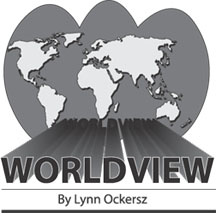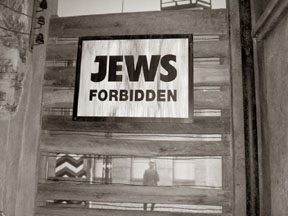Building a reconciliatory climate in the Middle East
 The holding of a forum in Iran on the Jewish Holocaust with the
reported intention of refuting the historical veracity of the
Nazi-inspired pogrom against the Jews in the run-up to the Second
World War, should be seen as a further fillip to extremism and
ethnopopulism in the Middle East. The holding of a forum in Iran on the Jewish Holocaust with the
reported intention of refuting the historical veracity of the
Nazi-inspired pogrom against the Jews in the run-up to the Second
World War, should be seen as a further fillip to extremism and
ethnopopulism in the Middle East.
It should be also seen as proof of the widening cultural and
ideological divide between the Jews and the Arabs-the principal
antagonists in the Middle East conflict. The veracity of the Jewish
Holocaust, which was hitherto considered a pointer to the abysmal
depths to which humanity could be brutalized and perverted, has
never been questioned by modern historians. The act of opening a
debate on the factual occurrence of the Holocaust, besides
re-opening psychic wounds which the world thought were in the
process of healing, would only further fuel ill-feeling and hatred
among hardline opinion on both sides of the ethnic divide in the
Middle East.
 Iranian President Mahmoud Ahmadinejad's observation that Israel
would suffer the same fate as the USSR could only be expected to
further exacerbate these tensions and divisions. Such polar
positions would in no way contribute towards advancing
reconciliation among the warring parties in the Middle East
imbroglio. Iranian President Mahmoud Ahmadinejad's observation that Israel
would suffer the same fate as the USSR could only be expected to
further exacerbate these tensions and divisions. Such polar
positions would in no way contribute towards advancing
reconciliation among the warring parties in the Middle East
imbroglio.
The principal parties to the conflict have suffered grievously
over the decades as a result of the prolonged armed confrontation
among them and the pain thus suffered by each of them has played a
substantial role in the sharpening of their separate group
identities. Hurtful observations and comments would have the effect
of driving the ethnic groups in question only further apart.
In complete contrast, outgoing UN Secretary General Kofi Annan's
observations on the Middle East merit careful consideration.
"Tensions in the region are near the breaking point. Extremism and
populism are leaving less political space for moderates, including
those states that have reached peace agreements with Israel," Annan
was quoted saying. He also observed that, "mistrust between Israelis
and Palestinians has reached new heights .... We need a new and
urgent push for peace".
The anti-Holocaust conference smacks of the extremism and
populism Annan has pinpointed. We are certainly witnessing a new
high in hardline sentiment.
However, a redeeming feature in this bleak scenario is the
pronouncement by the US-based independent group of experts on the
Iraqi situation who advocated the launching of a dialogue between
the US and states such as Iran and Syria.
Such a dialogue process would certainly help to build bridges in
the Middle East. While there is no doubt that Middle East peace
needs a fresh push, the antagonists, by thus dialoguing, could help
build a climate of reconciliation in the region. Commonalities and
not divisions need to be emphasized right now. The two-State formula
for peace in the Middle East which envisages a Palestinian state
alongside Israel, needs a "fresh push" and renewed advocacy.
[email protected] |


